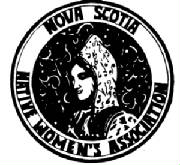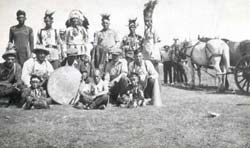|
|
 |
Micmac Word Set
| English (Français) |
Mi'kmaq |
| One (Un) |
Ne'wt |
| Two (Deux) |
Ta'pu |
| Three (Trois) |
Si'st or Ne'siskl |
| Four (Quatre) |
Ne'w |
| Five (Cinq) |
Na'n |
| Man (Homme) |
Ji'nim |
| Woman (Femme) |
E'pit |
| Dog (Chien) |
L'mu'j |
| Sun (Soleil) |
Na'gu'set |
| Moon (Lune) |
Tepgunu'set |
| Water (Eau) |
Samqwan |
| White (Blanc) |
Wape'k |
| Yellow (Jaune) |
Wataptek |
| Red (Rouge) |
Mekwe'k |
| Black (Noir) |
Maqtewe'k |
| Eat (Manger) |
Mijjit or Etlatalg |
| See (Voir) |
Nemi'k |
| Hear (Écouter) |
Nutaq |
| Sing (Chanter) |
Etlintoq |
| Leave (Partir) |
Maja'sit or Naqalk |

|
 |
First Nations people (both status & non-status) are the descendants
of the original inhabitants of the country now known as Canada. Wishing to expand its territory in the new land, the invading
British forces made "treaties" with the indigenous peoples they found there.
These "treaties" promised a great number of things to the original peoples in exchange for them
literally giving up an entire way of life and the freedom to move unchallenged throughout their traditional territories. Today's
First Nations peoples are the descendants of those who made the treaties with the newcomers. First Nations peoples are considered
sovereign people distinct from Canadian, Metis and Inuit peoples.
For thousands of years before the arrival of European settlers,
the Mi'kmaq called themselves L'nu'k, which simply means 'the people,' 'human beings.' Their present name, Mi'kmaq, derives
from nikmaq, meaning 'my kin-friends.' Their descendants are still living in what are now Nova Scotia, Prince Edward Island,
and parts of New Brunswick, Newfoundland and Québec. Many Mi'kmaq also make their homes in New England, particularly in Maine
and Massachusetts.
Language: The Mi'kmaq language, Mi'kmawi'simk or Mikmawisimk, is an Algonquian language spoken by 8000 Indians in the Canadian Maritimes (particularly Nova Scotia) and a few
US communities

|



